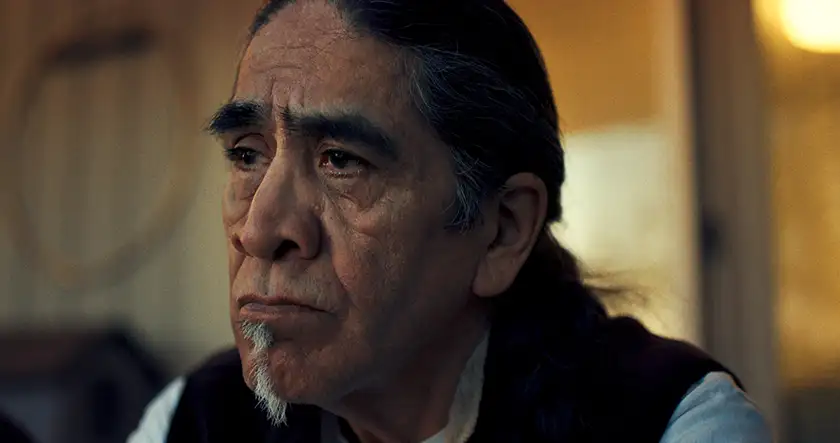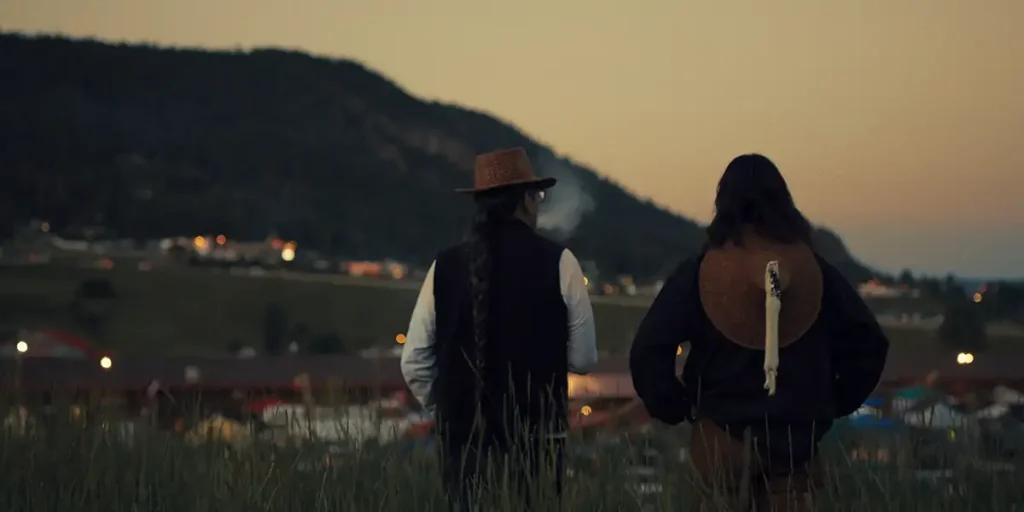Sugarcane is a powerful documentary capturing the ongoing trauma, and hope for a better future, of Canada’s mission school survivors.
Directors: Emily Kassie & Julian Brave NoiseCat
Genre: Documentary
Run Time: 107′
Rated: R
U.S. Release: September 20, 2024
U.K. Release: December 9, 2024
Where to Watch: Hulu, Disney +, On digital & VOD
The shadow of colonial and generational trauma looms large in Sugarcane, a documentary about the terrible legacy of Catholic Church-run residential schools for indigenous Canadians. The Williams Lake Indian Reserve in British Columbia, often colloquially referred to as the Sugarcane Reserve, exists now in the shadow of St Joseph’s Mission and the accompanying residential school, and its Secwepemc residents today have to face and untangle the horrors inflicted by settler violence as recently as the mid-20th century.
When unmarked graves were discovered at residential schools across Canada, setting off waves of protest in 2021, a reckoning was long overdue.
Executive produced by Lily Gladstone (Killers of the Flower Moon), Sugarcane marks the directorial debuts of Emily Kassie and Julian Brave NoiseCat, who craft a piece around the stories of the local Sugarcane Reserve community. Kassie also has credits as one of the documentary’s writers, producers, and cinematographers, and NoiseCat is a multi-generation descendant of the St Joseph’s survivors. His interviews with his family members reveal how deep the scars run. This process of excavating and capturing testimonies – and the imperfections thereof – is one of the most striking parts of Sugarcane. Even after decades, the pain is fresh and almost unbearable. It takes Kassie and NoiseCat several visits and conversations to get to the root of NoiseCat’s father’s story, but by not cutting out the difficult initial recollections and journey, the depth of this trauma – both personal and historical – is made tangible.
In the case of St Joseph’s, the Catholic ideas of sin were weaponised against vulnerable indigenous youths. While Christianity in its many forms has been a force for good in many people’s lives, it has been weaponised against Native Americans ever since the first Spanish conquistadors reached the continent. It is shocking to see the same subjugation and discrimination employed in very similar ways across almost five hundred years of history, but it’s proof that the injustices have never been righted. The treatment of unmarried mothers is especially brutal, leading to key revelations in the documentary. But what comes through in the subjects and overall tone of Sugarcane is not only despair about the past, but hope and resilience for the future. The indigenous people of Canada have survived despite the worst oppression, and Sugarcane boldly affirms their existence and survival.

Sugarcane is one of the best among a very strong year for documentary films (some of which, such as No Other Land and Soundtrack to a Coup d’Etat, also deal with colonial histories), but it also feels timely in regards to some of 2024’s narrative features in awards contention. Its investigation of abuses of power – to the point of murder – within a segregated school makes it a compelling companion piece to Nickel Boys, RaMell Ross’ extraordinary adaptation of Colson Whitehead’s prizewinning novel. Likewise, its exploration of a suppressed language – Secwepemctsín – in the face of state-sponsored violence and erasure covers similar themes as Kneecap, the fictionalised biopic of the eponymous Irish-language rap group. Sugarcane’s merits and importance are reason enough to seek out this documentary, and 2024 is far from the first year when these topics are in the news. But the overlap in dialogue at the cinema provides viewers a unique way to engage with these challenging, but essential, conversations.
Often difficult, always respectful, and reflecting personal histories through their communal connection, Sugarcane is a masterful documentary that comes upon the heels of a major period of reflection in Canadian society. This feels like the next step, not the closing of a painful national chapter. Perhaps closure is the wrong end to seek; perhaps the goal is bearing witness to the experiences of those who lived through the residential schools and not letting them be forgotten.
Sugarcane: Movie Plot & Recap
Synopsis:
A documentary exploring the legacy of abuses committed at a residential school for Canada’s indigenous peoples, using testimony from its survivors and their descendants.
Pros:
- Important conversation-starter dealing with issues relevant to today
- Beautiful cinematography
- Respectful to its documentary subjects
Cons:
- A heavy watch – best when you’re in the mood for something serious and meaningful
Sugarcane is now available to watch on Hulu and Disney+, and on digital and VOD.
Loud and Clear Reviews has an affiliate partnership with Apple, so we receive a share of the revenue from your purchase or streaming of the films when you click on some of the links on this page. This won’t affect how much you pay for them and helps us keep the site free for everyone.

